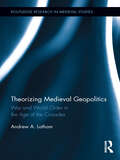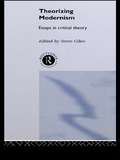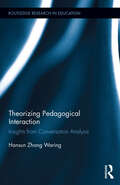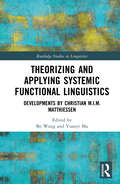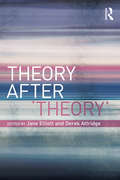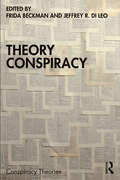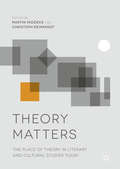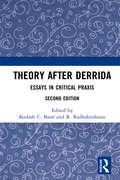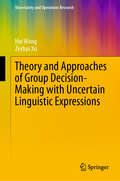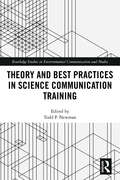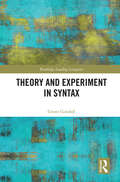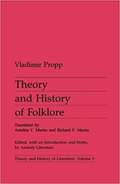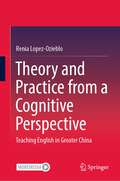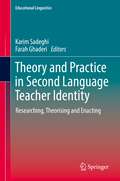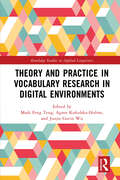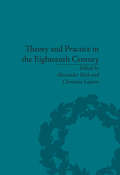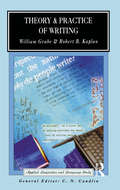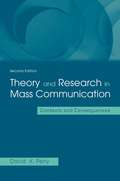- Table View
- List View
Theorizing Medieval Geopolitics: War and World Order in the Age of the Crusades (Routledge Research in Medieval Studies)
by Andrew LathamOver the past two decades or so, medieval geopolitics have come to occupy an increasingly prominent place in the collective imagination—and writings—of International Relations scholars. Although these accounts differ significantly in terms of their respective analytical assumptions, theoretical concerns and scholarly contributions, they share at least one common – arguably, defining – element: a belief that a careful study of medieval geopolitics can help resolve a number of important debates surrounding the nature and dynamics of "international" relations. There are however three generic weaknesses characterizing the extant literature: a general failure to examine the existing historiography of medieval geopolitics, an inadequate account of the material and ideational forces that create patterns of violent conflict in medieval Latin Christendom, and a failure to take seriously the role of "religion" in the geopolitical relations of medieval Latin Christendom. This book seeks to address these shortcomings by providing a theoretically guided and historically sensitive account of the geopolitical relations of medieval Latin Christendom. It does this by developing a theoretically informed picture of medieval geopolitics, theorizing the medieval-to-modern transition in a new and fruitful way, and suggesting ways in which a systematic analysis of medieval geopolitical relations can actually help to illuminate a range of contemporary geopolitical phenomena. Finally, it develops an historically sensitive conceptual framework for understanding geopolitical conflict and war more generally.
Theorizing Modernisms: Essays in Critical Theory
by Steve GilesAt a time when postmodernism seems to have achieved a dominant position in cultural and critical theory, the contributors to this volume present a much needed corrective to the misleading images of modernism which have dominated recent debate. Theorizing Modernisms includes an account of European modernism, and analysis of the work of Apollinaire and Aberti, Wyndham Lewis and Mike Johnson, and Kert Schwitters. Steve Giles provides a much needed overview of the relationship between modernism and the avant-garde, postmodernism and modernity.
Theorizing Pedagogical Interaction: Insights from Conversation Analysis (Routledge Research in Education)
by Hansun Zhang WaringPedagogical interaction can be observed through many different landscapes, such as the graduate seminar, the writing skills center, the after-school literacy program, adult ESL classrooms, and post-observation conferences. By viewing these settings through the lens of conversation analysis, this volume lays the groundwork for three principles of pedagogical interaction: competence, complexity, and contingency. The author explores these principles and how they inform what makes a good teacher, how people learn, and why certain pedagogical encounters are more enlightening than others. Drawn from the author’s original research in various pedagogical settings, this volume collects empirical insights from conversation analysis and contributes to theory building. Theorizing Pedagogical Interaction will appeal to students and scholars in applied linguistics, educational linguistics, and communication studies who are interested in the discourse of teaching and learning.
Theorizing a Colonial Caribbean-Atlantic Imaginary: Sugar and Obeah
by Keith SandifordThis book develops a theory of a Caribbean-Atlantic imaginary by exploring the ways two colonial texts represent the consciousnesses of Amerindians, Africans, and Europeans at two crucial points marking respectively the origins and demise of slavocratic systems in the West Indies. Focusing on Richard Ligon’s History of Barbados (1657) and Matthew ‘Monk’ Lewis’ Journal of a West India Proprietor (1834), the study identifies specific myths and belief systems surrounding sugar and obeah as each of these came to stand for concepts of order and counterorder, and to figure the material and symbolic power of masters and slaves respectively. Rooting the imaginary in indigenous Caribbean myths, the study adopts the pre-Columbian origins of the imaginary ascribed by Wilson Harris to a cross cultural bridge or arc, and derives the mythic origins for the centrality of sugar in the imaginary’s constitution from Kamau Brathwaite. The book’s central organizing principle is an oppositional one, grounded on the order/counterorder binary model of the imaginary formulated by the philosopher-social theorist Cornelius Castoriadis. The study breaks new ground by reading Ligon’s History and Lewis’ Journal through the lens of the slaves’ imaginaries of hidden knowledge. By redefining Lewis’ subjectivity through his poem’s most potent counterordering symbol, the demon-king, this book advances recent scholarly interest in Jamaica’s legendary Three Fingered Jack.
Theorizing and Analyzing Agency in Second Language Learning
by Xuesong Andy Gao Ping DetersThis book showcases how language learner agency can be understood and researched from varying perspectives by providing, for the first time, a collection of diverse approaches in one volume. The volume is organised into three main sections:the first sections offers an introduction to varying theoretical approaches to agency; the second section presents analyses of agency in a variety of empirical studies; and the third section focuses on the pedagogical implications of data-based studies of agency. The volume includes the work of researchers working in languages including English (ESL and EFL), Greek, Spanish, Swedish, Italian, Hindi, Marathi, Gujarati and Truku (an indigenous language in Taiwan) and with both child and adult language learners. This collection will serve as a key reference for researchers of language learning and teaching, sociolinguistics and language and identity.
Theorizing and Applying Systemic Functional Linguistics: Developments by Christian M.I.M. Matthiessen (Routledge Studies in Linguistics)
by Bo Wang and Yuanyi MaThis collection reflects on developments in the field of Systemic Functional Linguistics (SFL) as embodied in the work of Christian M.I.M. Matthiessen, highlighting his diverse contributions to the field from theoretical and applied perspectives. The book surveys Matthiessen’s academic career and illustrates the myriad ways in which his work has reverberated through to current innovations in SFL research. The book also exhibits his theoretical contributions to major linguistic topics and his influence on the development of SFL. Written by some of the world’s foremost scholars in the field, chapters cover such topics as theories of SFL and its applications in different domains as well as the developmental trajectories of SFL in major geographic areas. Addressing the key issues in SFL through the lens of Matthiessen’s career, this book is an accessible resource for students and scholars in systemic functional linguistics, as well as those interested in the systemic functional approach in related areas within linguistics.
Theorizing the Ideal Sovereign
by Daisy DeloguTheorizing the Ideal Sovereign, examines the ways in which vernacular biographies of kings from the later French Middle Ages reflected and contributed to transformations in late-medieval political and philosophical thought. Using a lens of literary analysis for works that have more often been read as historical source documents, Daisy Delogu demonstrates how theories of kingship evolved in the period of the "rediscovery" of Aristotle, the rise of the vernacular as a language of ethics and philosophy, and the Hundred Years' War. By means of a series of close readings of Jean de Joinville's Vie de Saint Louis, Guillaume de Machaut's Prise d'Alixandre, and Christine de Pizan's biography of Charles V, Delogu examines the ways in which biographical writings on kings could advance precise political aims. She also shows how these texts contributed to nascent ideas of nationhood, exerted pressure upon traditional ideals of kingship, and ultimately redefined the theoretical and practical bases of medieval kingship. This study of vernacular kings's lives illuminates the important role that literary works played in shaping ideas more traditionally discussed in legal, historical, or institutional terms. Theorizing the Ideal Sovereign restores late medieval kings's lives to ethical and political conversations of which they were an integral part, and revives the lively interaction between texts and readers that formed the basis for medieval reading experiences.
Theory After 'Theory'
by Derek Attridge Elliott JaneThis volume argues that theory, far from being dead, has undergone major shifts in order to come to terms with the most urgent cultural and political questions of today. Offering an overview of theory’s new directions, this groundbreaking collection includes essays on affect, biopolitics, biophilosophy, the aesthetic, and neoliberalism, as well as examinations of established areas such as subaltern studies, the postcolonial, and ethics. Influential figures such as Agamben, Badiou, Arendt, Deleuze, Derrida and Meillassoux are examined in a range of contexts. Gathering together some of the top thinkers in the field, this volume not only speculates on the fate of theory but shows its current diversity, encouraging conversation between divergent strands. Each section places the essays in their contexts and stages a comparison between different but ultimately related ways in which key thinkers are moving beyond poststructuralism. Contributors: Amanda Anderson, Ray Brassier, Adriana Cavarero, Eva Cherniavsky, Rey Chow, Claire Colebrook, Laurent Dubreuil, Roberto Esposito, Simon Gikandi, Martin Hagglünd, Peter Hallward, Brian Massumi, Peter Osborne, Elizabeth Povinelli, William Rasch, Henry Staten, Bernard Stiegler, Eugene Thacker, Cary Wolfe, Linda Zerilli.
Theory Aside
by Jason Potts Daniel StoutWhere can theory go now? Where other voices concern themselves with theory's life or death, the contributors to Theory Aside take up another possibility: that our theoretical prospects are better served worrying less about "what's next?" and more about "what else?" Instead of looking for the next big thing, the fourteen prominent thinkers in this volume take up lines of thought lost or overlooked during theory's canonization. They demonstrate that intellectual progress need not depend on the discovery of a new theorist or theory. Moving subtly through a diverse range of thinkers and topics--aesthetics, affect, animation and film studies, bibliography, cognitive science, globalization, phenomenology, poetics, political and postcolonial theory, race and identity, queer theory, and sociological reading practices--the contributors show that a more sustained, less apocalyptic attention to ideas might lead to a richer discussion of our intellectual landscapes and the place of the humanities and social sciences in it. In their turn away from the radically new, these essays reveal that what's fallen aside still surprises.Contributors. Ian Balfour, Karen Beckman, Pheng Cheah, Frances Ferguson, William Flesch, Anne-Lise François, Mark B. N. Hansen, Simon Jarvis, Heather Love, Natalie Melas, Jason Potts, Elizabeth A. Povinelli, Eve Kosofsky Sedgwick, Jordan Alexander Stein, Daniel Stout, Irene Tucker
Theory Conspiracy (Conspiracy Theories)
by Frida Beckman Di Leo, Jeffrey R.Theory Conspiracy provides a state-of-the-art collection that takes stage on the meeting and/or battlegrounds between conspiracy theory and theory-asconspiracy. By deliberately scrambling the syntax—conspiracy theory cum theory conspiracy—it seeks to open a set of reflections on the articulation between theory and conspiracy that addresses how conspiracy might rattle the sense of theory as such. In this sense, the volume also inevitably stumbles on the recent debates on postcritique. The suspicion that our ways of reading in the humanities have been far too suspicious, if not paranoid, has gained considerable attention in a humanities continuously questioned as superfluous at best and leftist and dangerous at worst. The chapters in this volume all approach this problematic from different angles. It features clear engaging writing by a set of contributors who have published extensively on questions of paranoia, conspiracy theory, and/or the state of theory today. This collection will appeal to readers interested in conspiracy theories, critical theory, and the future of humanities.
Theory Into Practice: An Introduction To Literary Criticism
by Ann B. DobieBeginning with approaches that students are already familiar with and then moving to less common schools of criticism, THEORY INTO PRACTICE provides extensive guidance for writing literary analyses from each of the critical perspectives.
Theory Matters
by Martin Middeke Christoph ReinfandtThis book demonstrates that theory in literary and cultural studies has moved beyond overarching master theories towards a greater awareness of particularity and contingency - including its own. What is the place of literary and cultural theory after the Age of Theory has ended? Grouping its chapters into rubrics of metatheory, cultural theory, critical theory and textual theory, the collection demonstrates that the practice of "doing theory" has neither lost its vitality nor can it be in any way dispensable. Current directions covered include the renewed interest in phenomenology, the increased acknowledgement of the importance of media history for all cultural practices and formations, complexity studies, new narratology, literary ethics, cultural ecology, and an intensified interest in textual as well as cultural matter.
Theory Matters
by Vincent LeitchFirst Published in 2003. In this book on what theory means today, the general editor of the Norton Anthology of Criticism and Theory explores how theory has altered the way the humanities do business. Theory got personal, went global, became popular, and in the process has changed everything we thought we knew about intellectual life. One of the most adroit and perceptive observers of the critical scene, Vincent Leitch offers these engaging snapshots to show how theory is at work. This is an utterly readable little book by one of our best historians on the theoretical turn that over the past thirty years has so powerfully changed the academy.
Theory after Derrida: Essays in Critical Praxis
by R. Radhakrishnan Kailash C. BaralA critical anthology that re-examines Jacques Derrida’s thought by way of theory and praxis, this volume reflects on his striking legacy and the future of theory. Among contemporary thinkers, Derrida challenges not only our ways of thinking but also hitherto methods of inquiry. This book captures how Derrida renovates and re-energises philosophy by questioning the fundamental assumptions of Western philosophical thought. By doing so, he exposes the intricate lie behind binaries, such as speech/writing, nature/culture, male/female, black/white, literature/criticism, etc., which have continued to shape our worldview, where a hegemonic centre is always already in place dominating or marginalising the ‘other’. A significant contribution to literary theory, this book explores not only the status of Derrida’s contribution as a critical thinker but also the status of critical theory as such in the contemporary milieu. The central question that it asks is whether we should dismiss Derrida as a thinker who espoused an extreme form of relativism, bordering on nihilism, or has he something fundamental to contribute to the future of theory. Could it be that deconstruction is not destruction but a possibility that casts doubts on whether the present can have faith in future? This second edition includes a new Postscript and addresses some important concerns of our times, such as religious practice, art and aesthetics, translation, sociology of philosophy, and democracy. Scholars and researchers of English literature, philosophy, sociology and cultural studies will find this work particularly interesting.
Theory and Approaches of Group Decision Making with Uncertain Linguistic Expressions (Uncertainty and Operations Research)
by Zeshui Xu Hai WangThis book mainly introduces a series of theory and approaches of group decision-making based on several types of uncertain linguistic expressions and addresses their applications. The book pursues three major objectives: (1) to introduce some techniques to model several types of natural linguistic expressions; (2) to handle these expressions in group decision-making; and (3) to clarify the involved approaches by practical applications. The book is especially valuable for readers to understand how linguistic expressions could be employed and operated to make decisions, and motivates researchers to consider more types of natural linguistic expressions in decision analysis under uncertainties.
Theory and Best Practices in Science Communication Training (Routledge Studies in Environmental Communication and Media)
by Todd NewmanThis edited volume reports on the growing body of research in science communication training, and identifies best practices for communication training programs around the world. Theory and Best Practices in Science Communication Training provides a critical overview of the emerging field of by analyzing the role of communication training in supporting scientists’ communication and engagement goals, including scientists’ motivations to engage in training, the design of training programs, methods for evaluation, and frameworks to support the role of communication training in helping scientists reach their communication and engagement goals. This volume reflects the growth of the field and provides direction for developing future researcher-practitioner collaborations. With contributions from researchers and practitioners from around the world, this book will be of great interest to students, scholars and, professionals within this emerging field.
Theory and Experiment in Syntax (Routledge Leading Linguists)
by Grant GoodallThis book reflects on key questions of enduring interest on the nature of syntax, bringing together Grant Goodall’s previous publications and new work exploring how syntactic representations are structured and the affordances of experimental techniques in studying them. The volume sheds light on central issues in the theory of syntax while also elucidating the methods of data collection which inform them. Featuring Goodall’s previous studies of linguistic phenomena in English, Spanish, and Chinese, and complemented by a new introduction and material specific to this volume, the book is divided into four sections around fundamental strands of syntactic theory. The four parts explore the dimensionality of syntactic representations; the relationship between syntactic structure and predicate-argument structure; interactions between subjects and wh-phrases in questions; and more detailed investigations of wh-dependencies but from a more overtly experimental perspective. Taken together, the volume reinforces the connections between these different aspects of syntax by highlighting their respective roles in defining what syntactic objects look like and how the grammar operates on them. This book will be a valuable resource for scholars in linguistics, particularly those with an interest in syntax, psycholinguistics, and Romance linguistics.
Theory and History of Folklore (Theory And History Of Literature Series #5)
by Vladimir ProppTheory and History of Folklore (Volume 5) (Theory and History of Literature)
Theory and Practice from a Cognitive Perspective: Teaching English in Greater China
by Renia Lopez-OziebloThis book is intended as a theoretical and practical resource for both new and experienced teachers of a second language. It integrates some of the ideas from cognitive linguistics into existing classroom approaches for teaching English as a second language through a series of lesson plans developed by teachers of English from Mainland China and Hong Kong. The lesson plans provide step-by-step instructions for teachers, including resources and an explanation of the theories underpinning each step. These plans, many of which are integrated into specific English as a foreign language textbook units, encourage teachers to be creative by adding or adapting the material they have in order to engage their students. Although the main audience is English teachers, the theoretical principles covered are applicable to teachers of any foreign language and the practical examples, provided in the lesson plans, can be easily modified to teach other languages as well. Similarly, it is not just for teachers working in Chinese contexts but for anyone interested in embodied cognition as a teaching approach. I intend these pages to serve as a companion for teachers to reflect on their existing practices, to provide new ideas and to make them aware of the many factors affecting learning.
Theory and Practice in Second Language Teacher Identity: Researching, Theorising and Enacting (Educational Linguistics #57)
by Karim Sadeghi Farah GhaderiThis book brings together the current theory, research and practical perspectives from different parts of the world on language teacher identity in an attempt to better understand the nature of identities teachers in different contexts develop. By linking theory to pedagogy, the book examines how second language teacher identities are shaped and explores the various links between teacher identities and variables that affect the formation of identities. Theory and Practice in Second Language Teacher Identity includes a foreword by Jack Richards (University of Sydney and RELC), an afterword by Peter de Costa (Michigan State University) and holds 20 invited chapters by established and active scholars and teacher educators to discuss the various aspects of in-service and pre-service second language teacher identity development. It also addresses the way the COVID-19 pandemic has impacted teacher identities and examines under-researched issues, such as the intersection between gender and race in second language teacher identity development and identity construction in second languages other than English.What does it mean to be a teacher of English as a second language in an age of globalization, new media, technological revolution and de-institutionalized knowledge? How do teachers gain pre-service and in-service expertise, a sense of professional identity, and educational integrity? And how have they dealt with the extra-burden imposed by the pandemic? This thought-provoking volume offers valuable perspectives on these important issues in the professional development of English teachers worldwide. — Prof. Claire Kramsch, University of California, Berkeley, USA.The way we see ourselves and are seen by others influences our social and professional interactions. Teacher identity and sense of agency is therefore not merely a matter of research interest for it impacts learners and learning, which makes the topic of this book extremely important. With chapters located in a wide range of countries – from USA to Australia via UAE, Thailand and others – and drawing on a variety of research methods, the book synthesizes extant research and develops many new research avenues. It does so not only with theory in mind but with practical lessons for teachers and teacher educators and thus becomes an essential volume for our libraries and studies. — Prof. Michael Byram, University of Durham, UK.In this compelling collection, co-edited by Karim Sadeghi and Farah Ghaderi, the authors address key questions about language teacher identity in contemporary applied linguistics: What is the relationship between language teacher identity and language teacher agency? To what extent does ideology impact language teacher identity? How do language teachers navigate an increasingly globalized and unequal world? Authors from different regions of the world draw on diverse methodologies to share insightful research on both pre-service and in-service language teacher identity, making an important contribution to applied linguistics and TESOL at a time of great social and educational change. — Prof. Bonny Norton (FRSC), University Killam Professor and Distinguished University Scholar, University of British Columbia, Canada.“Theory and Practice in Second Language Teacher Identity” captures recent thinking about language teacher identity. The broad array of excellent chapter contributions explores multiple dimensions of identity, from teacher agency and emotions to the disruptive effects of the Covid pandemic on teachers’ professional lives and practices. The studies draw on a number of theoretical perspectives and demonstrate the use of both familiar and innovative research methodologies. The relevant topics, the up-to-date bibliographic sources, and the useful research findings make this edited volume an essential addition to your bookshelf. — Prof. Gary Barkhuizen, University of Auckland, New Zealand.
Theory and Practice in Vocabulary Research in Digital Environments (Routledge Studies in Applied Linguistics)
by Agnes Kukulska-Hulme Mark Feng Teng Junjie Gavin WuThis collection is a comprehensive resource on the state of second language vocabulary learning today, building on earlier studies to spotlight the diversity of issues and foci in the field toward encouraging further advancements in both research and practice.The volume foregrounds the importance of vocabulary learning in language teaching and learning and in effective written and verbal communication, charting the range of approaches and theories used to address the unique challenges of vocabulary instruction. While there exists a well-established body of vocabulary research, this book takes those lines of inquiry in new directions by exploring how technology has shifted the focus from teacher-led delivery to more activity-driven experiences. Chapters from prominent researchers and rising scholars feature studies on emergent approaches in virtual environments such as interactive whiteboards, CMC, virtual world learning, and mobile-assisted language learning. In offering a holistic portrait of technology-enhanced vocabulary learning the volume makes the case for the power of technological tools in fostering optimal environments for encouraging vocabulary acquisition and in turn, the potential opportunities for future research and pedagogical applications.This book will be of interest to students and scholars in second language acquisition, language education, TESOL, and applied linguistics.
Theory and Practice in the Eighteenth Century: Writing Between Philosophy and Literature
by Alexander Dick Christina LuptonBrings together scholars who use literary interpretation and discourse analysis to read 18th-century British philosophy in its historical context. This work analyses how the philosophers of the Enlightenment viewed their writing; and, how their institutional positions as teachers and writers influenced their understanding of human consciousness.
Theory and Practice of Writing: An Applied Linguistic Perspective (Applied Linguistics and Language Study)
by Robert B. Kaplan William GrabeThis book undertakes a general framework within which to consider the complex nature of the writing task in English, both as a first, and as a second language. The volume explores varieties of writing, different purposes for learning to write extended text, and cross-cultural variation among second-language writers.The volume overviews textlinguistic research, explores process approaches to writing, discusses writing for professional purposes, and contrastive rhetoric. It proposes a model for text construction as well as a framework for a more general theory of writing. Later chapters, organised around seventy-five themes for writing instruction are devoted to the teaching of writing at the beginning, intermediate, and advanced levels. Writing assessment and other means for responding to writing are also discussed.William Grabe and Robert Kaplan summarise various theoretical strands that have been recently explored by applied linguists and other writing researchers, and draw these strands together into a coherent overview of the nature of written text. Finally they suggest methods for the teaching of writing consistent with the nature, processes and social context of writing.
Theory and Research in Mass Communication: Contexts and Consequences (Routledge Communication Ser.)
by David K. PerryThis updated edition presents a civic journalism treatment of the field of mass communication research. The sine qua non of the civic journalism movement seems to center around an implicit assumption that the human mind is an evolved part in the natural world, not a detached spectator as much traditional philosophy assumes. Thus, it has attempted to encourage journalists and members of their audiences to participate actively in civic life. Applying the same idea to mass communication academics, this book focuses on the empirical consequences of their work, especially its possible impact on human life. It argues that researchers need to connect with the broader communities in which they live and considers the impact of media research on society. Features of the second edition include: *detailed update of research evidence concerning the media violence issue; *additional material concerning media ownership structures and their possible relationship to media content and effects; *new material focusing on the impact of tobacco and alcohol advertising; *updated and expanded section concerning the history of media studies; and *an expanded discussion of philosophical issues pertaining to theory construction. This book is intended for graduate and advanced undergraduate students studying mass communication theory and related subjects, such as communication theory, media effects, media literacy, and media and society.
Theory and the Disappearing Future: On de Man, On Benjamin
by J. Hillis Miller Tom Cohen Claire Colebrook with a de ManPaul de Man is often associated with an era of ‘high theory’, an era it is argued may now be coming to a close. This book, written by three leading contemporary scholars, includes both a transcript and facsimile print of a previously unpublished text by de Man of his handwritten notes for a lecture on Walter Benjamin. Challenging and relevant, this volume presents de Man’s work as a critical resource for dealing with the most important questions of the twenty-first century and argues for the place of theory within it. The humanities are flooded with crises of globalism, capitalism and terrorism, contemporary narratives of financial collapse, viral annihilation, species extinction, environmental disaster and terrorist destruction. Cohen, Colebrook and Miller draw out the implications of these crises and their narratives and, reflecting on this work by de Man, explore the limits of political thinking, of historical retrieval and the ethics of archives and cultural memory.
